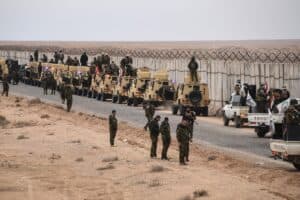Ahmed al-Sharaa’s rise promises peace, but can he overcome Syria’s deep divisions and lead to democracy, or will radicalism prevail once again?

They’re still celebrating the miraculous fall of the Assad regime in Damascus and the killing has stopped in Syria, except for parts of the north, east and south.
So, what are the odds that the man whose fighters brought down the regime, Ahmed alSharaa, can bring peace, prosperity and even democracy to Syria?
Sharaa, until recently known as Abu Mohammed al-Jolani, is an Islamist who started out in al-Qaeda.
He is still listed as a terrorist, which he is not, or at least not any more – but as an Islamist he would normally reject modern forms of Islam that permit abominations like democracy and equal rights for women.
That would not endear him even to Sunni Muslims (70% of Syria’s population).
ALSO READ: At least 100 000 bodies in Syrian mass grave, US advocacy group head says
Sharaa is Sunni himself, but most of them would see his Islamist doctrines as extreme. And he really frightens the 30% of Syrians who belong to various religious minorities: Alawites, Ismailis, mainstream Shia Muslims, Christians and Druze.
To make matters worse, one of the Muslim minorities, the Alawites, have run the country for the past 53 years under the Assad family.
Now, an explicitly Islamist Sunni force called Hayat Tahrir al-Sham (HTS) has overthrown the Assad regime. Sharaa promises that the rights of all minorities will be respected and the new Syria will be democratic, but he would say that at this stage, wouldn’t he?
One might also mention the country’s ethnic diversity (Arabs, Kurds, Turkmen, Druze), the fact that Syria has just been through a 13- year civil war that has left half the population refugees, either at home or abroad, and the presence of foreign troops (Turkish, Russian, Israeli and American) on its soil, all with blood on their hands.
Israel has just destroyed the Syrian air force in more than 300 airstrikes and seized land across the Syrian border, just in case it doesn’t like the policies of the new government.
ALSO READ: UN calls for ‘free and fair’ elections in Syria
The Russians, Assad’s biggest backers, may leave, but the Turks are carving out Syrian territory along the border for a buffer zone.
So what is Syria’s biggest problem? It is the fear that HTS will try to turn Syria into a radical religious dictatorship like Afghanistan.
That would terrify not only the Americans, the Russians and the various Shia countries and minorities of the Middle East, but also all the nonextremist Sunni states in the region.
Syria would be isolated and stigmatised as a terrorist state, its people would start fleeing again and the killing would doubtless also restart before long.
The best insurance against this disaster would be a secular democracy where religious beliefs are a strictly private matter, but it’s unlikely that HTS will permit that. So, what’s the least bad available option? Perhaps some version of the old Ottoman millet system, where every religious group ran its own affairs but Sunni Turks made the big decisions.
ALSO READ: Syria since Assad’s overthrow: Latest developments
In the Syrian case, it would be Sunni Arabs making the big decisions, while the other religious groups (and also an ethnic group, in the case of the Kurds) would have broad autonomy in matters closer to home.
Even this kind of compromise will be hard for Ahmed al-Sharaa and HTS to accept, however, because fundamentalists of any variety have a big problem with secular states. If they truly believe in their version of God, then they should do what he wants – and what he wants in the Islamist and most other fundamentalist versions of God, is not a secular state.
Not to do God’s will, when it is in your power to do it, is definitely a sin. As the Vatican used to put it in the bad old days: “Error has no rights.”
Even if Sharaa can talk himself into accepting a democratic and secular state, it’s an open question whether the men around him can. (They are all men, of course.) What Syria needs is another miracle.
Support Local Journalism
Add The Citizen as a Preferred Source on Google and follow us on Google News to see more of our trusted reporting in Google News and Top Stories.






